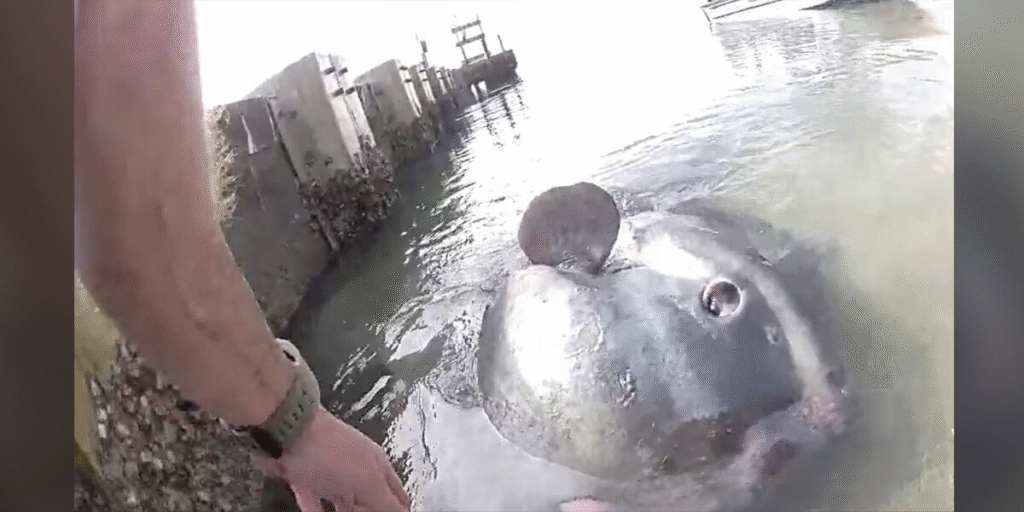The world from the perspective of an ocean sunfish is typically a deep, blue, frictionless void. Mola, as he was known in his own strange, silent way, was a giant, an aquatic disc of silver-gray cartilage and skin, designed for drifting in the warming currents and diving into the icy trenches.
But this morning, Mola’s world was wrong. It was too bright, too shallow, and violently gritty. He had been chasing jellyfish and somehow, in the confusion of the high tide, found himself wedged against a concrete seawall, stranded in a few feet of muddy, tepid water near a dock. His enormous, flattened body was too heavy, too awkward, to maneuver in the sludge.
Panic, a cold, alien fear, set in. Every slight current that had once been a gentle nudge was now a terrifying drag toward the dry concrete of the dock’s foundation, where barnacles bristled like iron teeth.

He tilted his great, bewildered head toward the sun-drenched surface, and that’s when he saw him: Deputy Markenson.
The Deputy, a man accustomed to the predictable chaos of land, was knee-deep in the shallow bay water, his uniform dark with the dampness of his task. He wasn’t shouting. He wasn’t pointing. He was simply there.
Mola’s eye—a giant, perfectly circular, black disc nestled into the corner of his smooth, strange face—stared upward. It was an eye built to absorb the dim light of the deep ocean, but now it was fixed on the man. In that vast, unblinking orb, there was no panic, only a deep, ancient despair—and perhaps, a flicker of bewildered hope.
Markenson felt the weight of that gaze. The sunfish was immense, easily seven feet tall from fin tip to fin tip, its dorsal fin cutting the surface like a dull, gray sail. The sheer scale was daunting, but the fish was suffering, its heavy body scraped raw by the rough concrete and the oyster shells clinging to the pier pilings.
“Alright, big guy,” Markenson murmured, wading deeper. He knew one wrong move could injure the Mola further, or cause the massive fish to thrash and hurt itself, or him.
The rescue wasn’t a heroic heave; it was a slow, agonizing dance of physics and patience. Markenson reached out, gently pressing his hands onto the Mola’s thick, leathery hide, right near the base of the massive dorsal fin. The skin was strangely smooth and cool, like wet sandstone.

He began to push, not with force, but with sustained, careful pressure, aiming to pivot Mola’s body back toward the open channel. The fish was heavy, a passive, dead weight that defied all logic. Each inch gained required a grunt of effort from the Deputy.
As Markenson pushed, Mola remained absolutely still, his giant eye following the man’s every movement. It was a silent conversation: Are you helping? Are you safe? The fish seemed to hold its breath, entrusting its monumental, helpless body to this strange, upright land creature.
For fifteen minutes, the Deputy strained, pushing, nudging, and directing the leviathan. Finally, with a deep, muddy groan, Mola’s body broke free of the sticky friction of the bottom. A tiny current, summoned by Markenson’s persistent effort, caught the sunfish’s unique shape.
Mola felt the blissful slide of depth beneath him. The pressure lifted. He gave one smooth, almost imperceptible flick of his massive fins and drifted away from the wall. He paused for a moment, his giant eye still trained on the Deputy standing in the shallows.
Then, with the slow, dignified movement of a sailing ship, the ocean sunfish slipped away from the gray dock, descending back into the blue expanse, leaving the Deputy exhausted, soaked, and profoundly humbled by the life he had just saved.


